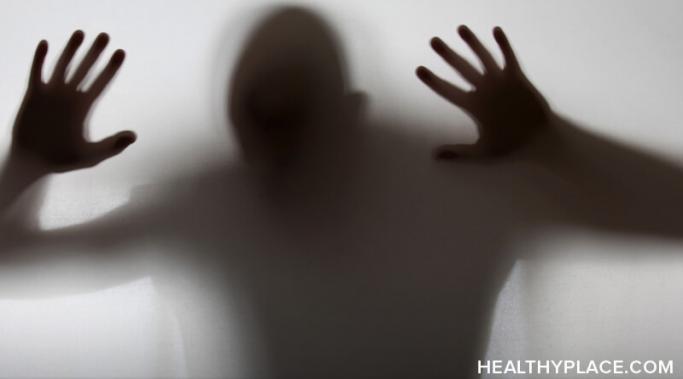We all have a mental health.
And each of our mental health is in flex all of the time. We, our minds and our bodies and our hearts, change every moment. What separates people with so called "mental illness" (I hate this term) is an us-them mentality. A simple–while misdirected–belief that mentally ill people are different. And that begets fear.
I am very excited that HealthyPlace.com began their Stand Up For Mental Health Campaign this week. This award winning website wants to break the stigma by having people join together and speak out about their problems! I say, let's do it!
If we do it, other people will feel less alone and isolated. And I think that heals better than anything.
Help us spread the word. Go here to put a button on your website like mine below.
Anxiety Causes
Guilt can mobilize or motivate. Which would you prefer? Guilt is an all too common trigger for anxiety. This video covers what to do about it.
Guilt Can Immobilize
Guilt keeps us stuck when we feel like we are unforgivable. It is so definite, there is no room for anything else. Why try anything or attempt to see yourself another way? You are unforgivable. This thought pattern not only keeps you from healing, it also prevents you from contributing to anyone around you. It can make you anxious, avoid activities and people, and let go of dreams and relationships.
Fear of losing someone you love is a common fear. (Or something happening to someone you love.) These fears comes from a great love. The fear is love. But once you realize the love, and take action on that, there is no point to the fear. Fear is immobilizing, love is energizing.
Remember, the biological reason for fear is to get us to act, after the action, the fear is pointless. (Worse than pointless, as it hurts you.)
PTSD (Post Traumatic Stress Disorder) is a common ailment that is often misdiagnosed. That's because the symptoms of PTSD are similar to many other mental health disorders listed in the DSM manual. These include but are not limited to ADHD, Bipolar Disorder, Anxiety Disorders, Adjustment Disorders, Depressive Disorders, Borderline Personality Disorder, OCD, and Oppositional Defiant Disorder. Surprised?
I know I feel it, the cantankerous anxiety that seeps into my soul when I watch the news. How with every murder report, every bomb, every child drowning, every political mudsling; my faith in the future shrivels up a bit. My helplessness fills to the brim.
So what is the answer? Not watch it? Avoid all negativity? Pretend it doesn't exist?
No.
Flexibility is a main ingredient in countering anxiety
Anxiety usually wants us to think that we need something a certain way "or else." (Not that it tells us what the unsavory consequences are: Anxiety is always vague, never clear. This is how it holds it's power.)
So when things don't happen that certain way, darn it, that good-for-nothing Anxiety has us all up in arms. Tied in a knot. Fumbling and immobilized. Discombobulated.
My anxiety shot through the roof when I became a parent. Everything seemed a little more important. I had a huge responsibility to keep this other human being safe and happy. Not just responsibility, but a strong desire to give him the world and never let him suffer.
Panic attacks suck the reality out of us!
I talked two people down from panic attacks recently and both of them had been worrying that they had lost touch with reality. They felt totally disconnected to the world around them. In talking to them, they were so convincing. I almost believed that this episode was different. But I let go of my own fear for them. (My worry doesn't help anyone.) I quickly assessed that they were not, in fact, psychotic. They were speaking rationally and eloquently.
And I remember from my panicky days how I felt different and disconnected.
Why is fear so powerful that it takes over even our rational mind?
The answer to that is that survival is the most important consideration in evolutionary development. In an article in the December 14, 2007 Newsweek, entitled “The Roots of Fear,” Sharon Begley writes:
When deciding on ending a relationship, the first question we ask ourselves is: How do I know when enough is enough? Someone very special and beautiful asked me that question this week.
In our culture, we are faced with all kinds of messages about relationships: see the good in people, relationships take work, rise above, and don't have too many expectations. Then, don't put up with anyone's disrespect, take care of yourself, set limits, leave abuse. These messages convolute all our decisions on how to set boundaries in relationships or know when it is right for us to leave them. We don't know who to blame, us or them. Add to it worry and fear about being alone, or being abandoned, or about other people judging you, and it becomes a maze to wade through.








